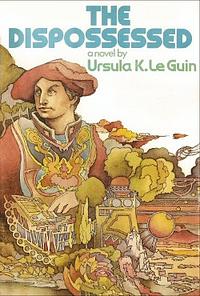Take a photo of a barcode or cover
adventurous
inspiring
reflective
medium-paced
Plot or Character Driven:
Character
Strong character development:
Yes
Loveable characters:
Yes
Diverse cast of characters:
Yes
Flaws of characters a main focus:
Yes
adventurous
informative
reflective
medium-paced
Plot or Character Driven:
Character
Strong character development:
Yes
Loveable characters:
Yes
Diverse cast of characters:
N/A
Flaws of characters a main focus:
No
adventurous
hopeful
reflective
The frontispiece is a map of Anarres and Urras, which had me exited before I had even read the first sentence; I love to see a map at the outset of a novel. (They’re usual in LeGuin’s novels, but that doesn’t change my feelings.)
LeGuin’s writing is great for how she so totally immerses the reader in the world of the story right from the start. I always find myself scrabbling for some mental purchase at the starts of Hanish novels, but once I find it I’m locked in. Like the other Hanish novels, the culture of Anarres and Urras feels so thought out and believable that it gives the work an anthropological feeling. You can imagine they’re really out there, orbiting Tau Ceti.
I realized (maybe kinda late) that the form the narrative takes matches up with the temporal physics Shevek is working on the whole story. The Urras chapters have the reader experiencing time linearly, so the new one picks up right where the last one left off. However, the Anarres chapters are scattered in time, they always take place much later on from when the last left off. Shevek’s Simultaneity Theory posits that all time has already happened, each moment being like a page in a book, so there could be moments disconnected from one another—like in the Anarres chapters. The critics of his theory say that that’s not how time is experienced, so it can’t be correct—time is experienced as linear, like the Urras chapters. This kind of thing is great!
LeGuin’s writing is great for how she so totally immerses the reader in the world of the story right from the start. I always find myself scrabbling for some mental purchase at the starts of Hanish novels, but once I find it I’m locked in. Like the other Hanish novels, the culture of Anarres and Urras feels so thought out and believable that it gives the work an anthropological feeling. You can imagine they’re really out there, orbiting Tau Ceti.
I realized (maybe kinda late) that the form the narrative takes matches up with the temporal physics Shevek is working on the whole story. The Urras chapters have the reader experiencing time linearly, so the new one picks up right where the last one left off. However, the Anarres chapters are scattered in time, they always take place much later on from when the last left off. Shevek’s Simultaneity Theory posits that all time has already happened, each moment being like a page in a book, so there could be moments disconnected from one another—like in the Anarres chapters. The critics of his theory say that that’s not how time is experienced, so it can’t be correct—time is experienced as linear, like the Urras chapters. This kind of thing is great!
challenging
dark
tense
slow-paced
Plot or Character Driven:
Character
Loveable characters:
No
Diverse cast of characters:
Complicated
Flaws of characters a main focus:
Yes
reflective
slow-paced
Plot or Character Driven:
Character
Strong character development:
No
Loveable characters:
Complicated
Diverse cast of characters:
Yes
Flaws of characters a main focus:
Yes
My notion of this book is that Ms. LeGuin read [book: Atlas Shrugged] and said "That's not how you write about an individualist and make the person not look like a sociopath! Here's how you do it." And thus became the Dispossessed. It feels like the kind of book you should read at the same time you read all those dystopias in high school ([book: Brave New World], [book: 1984], [book: The Handmaid's Tale]).
reflective
fast-paced
Plot or Character Driven:
Character
Strong character development:
Complicated
Loveable characters:
Yes
Flaws of characters a main focus:
No
adventurous
hopeful
medium-paced
Plot or Character Driven:
Plot
Strong character development:
Yes
Loveable characters:
Yes
hopeful
inspiring
reflective
medium-paced
Plot or Character Driven:
A mix
Strong character development:
No
Flaws of characters a main focus:
No
I picked this up after Parable of the Sower because 1) it was available from my library immediately and 2) this book had been floated as another option for our poliEd bookclub fiction pick. We’ve mostly read non-fiction, so many of us thought it was time to tap into our imaginations a little more. While we did ultimately choose Parable of the Sower for our bookclub, I do hope we do read it together one day!
The style of the writing at first was hard to get into but once I fell into step with Shevek’s life I was pretty hooked. First, I want to mention how I really loved the rhythm of the book, moving from present to past, from Urras and Anarres, from capitalist society to anarchist society. I loved to see such an overt rendering of an anarchist society, with contemplations on mutual aid, how to balance collectivism and individualism and how utopia must be created and discerned daily. This is my first time reading Le Guin and I found her writing strangely poetic. I guess there is an intellectualism to it but still quite emotional. Overall, this book struck a really beautiful balance of sharing an interesting and engaging story of a man’s life as he grows up as well as exploring anarchism in an imaginary world with scarce resources. I think Le Guin really succeeded in reminding me the beauty of anarchism and why I am so drawn to mutual aid work and trying to build a society where humans work together for our collective good. Really needed to read and be inspired in a time like this! Recommend to folks interested in exploring imaginary futures with mutual aid as an intrinsic value of society.
Also, want to mention that I found the exploration of prison early on in the book so haunting and gripping at the same time. Le Guin really paints a picture of the sheer horror it is to imprison another in so few pages. Masterful storytelling from my perspective.
The style of the writing at first was hard to get into but once I fell into step with Shevek’s life I was pretty hooked. First, I want to mention how I really loved the rhythm of the book, moving from present to past, from Urras and Anarres, from capitalist society to anarchist society. I loved to see such an overt rendering of an anarchist society, with contemplations on mutual aid, how to balance collectivism and individualism and how utopia must be created and discerned daily. This is my first time reading Le Guin and I found her writing strangely poetic. I guess there is an intellectualism to it but still quite emotional. Overall, this book struck a really beautiful balance of sharing an interesting and engaging story of a man’s life as he grows up as well as exploring anarchism in an imaginary world with scarce resources. I think Le Guin really succeeded in reminding me the beauty of anarchism and why I am so drawn to mutual aid work and trying to build a society where humans work together for our collective good. Really needed to read and be inspired in a time like this! Recommend to folks interested in exploring imaginary futures with mutual aid as an intrinsic value of society.
Also, want to mention that I found the exploration of prison early on in the book so haunting and gripping at the same time. Le Guin really paints a picture of the sheer horror it is to imprison another in so few pages. Masterful storytelling from my perspective.




